3D-printed brains reveal Alzheimer's secrets
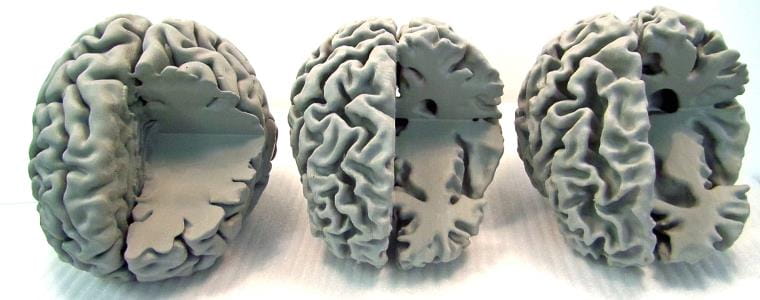
The University of the West of England (UWE Bristol)'s Health Tech Hub has printed three 3D brain models that show the effects of dementia on the organ. Printed for Bristol based dementia charity BRACE, the models each have a section missing, which offers views of the inside of the organ and how the disease has depleted its density.
Using brain scans and 3D imaging provided by clinical dementia research group ReMemBr Group, which BRACE part-funds, the Health Tech Hub was able to accurately produce two Alzheimer's diseased brain models and a healthy brain model exactly to scale, using a 3D printer. Each brain took 72 hours to print and is made out of a resin material. The Health Tech Hub covered the full cost of production.
Alzheimer's disease causes progressive atrophy to the brain - a wasting away and shrinking of the brain tissue, which happens at a much faster speed than the old age-related shrinking that would be expected in a healthy brain. The printing of these models will enable BRACE, the ReMemBr Group and the South West Dementia Brain Bank to use them as aids to teach and raise awareness of dementia.
Health Tech Hub Co-Director Professor Richard Luxton said: "These models mean you can physically see the effects of dementia and it's shocking the extent to which a brain touched by Alzheimer's wastes away. You can see that the ventricles [cavities in the organ] are bigger because of lost brain tissue and the two diseased brains are also noticeably lighter compared to the healthy one."
Dr Elizabeth Coulthard of the ReMemBr Group said: "By printing from real brain scans, we can clearly see which areas of the brain are affected by dementia diseases such as Alzheimer's disease. The areas of brain that shrink are different in different dementias.
"The memory area, called the hippocampus, shrinks early on in Alzheimer's disease. In contrast, the front of the brain shrinks first in behavioural variant frontotemporal dementia (Pick's disease)."
Dr Laura Palmer, manager of the South West Dementia Brain Bank said: "A healthy brain weighs between 1,300 and 1,400 grams; however, a brain with Alzheimer's will weigh between 1170 and 1260 grams. In people with end-stage Alzheimer's disease we often find that the brain can weigh as little as around 1000 grams at the time of death.'
The world-class Health Tech Hub facility at Frenchay campus is focused on advancing technology that enables people to live independently and manage their own health and well-being, thereby ensuring they spend the least possible time in hospital.
It works with health technology organisations and companies in the region, helping them with product development and prototype testing. Projects it is involved in include DNA sequencing, looking at the chemistry of biosensor surfaces, and visualising DNA from bacteria.
The Health Tech Hub is partly funded by the European Regional Development Fund and the Local Grow Fund through the Local Enterprise Partnership.
Related news

18 February 2026
Immersive theatrical reimagining of Moby Dick brings unique creative captioning to a live audience
An experimental theatre experience by UWE Bristol lecturer Sharon Clark and artist Jack Hardiker-Bresson uses creative captions for accessible storytelling.
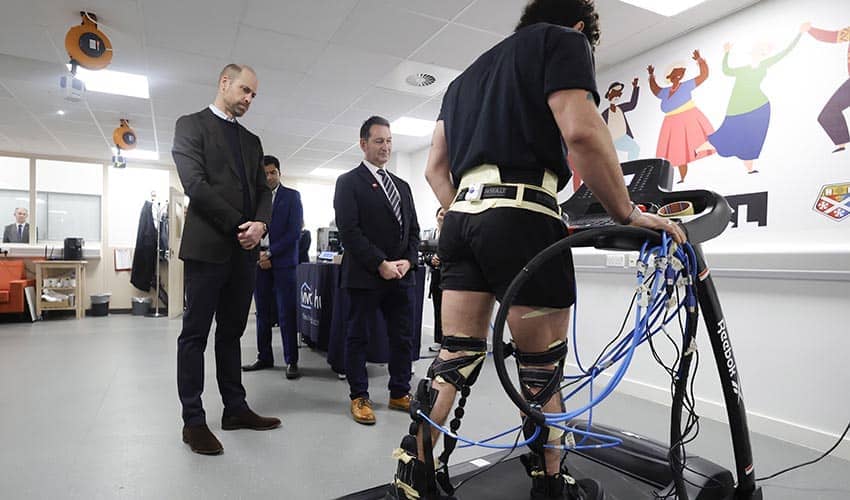
22 January 2026
Prince of Wales visits UWE Bristol to see pioneering robotic tech tackling societal health challenges
The Prince of Wales visited the Bristol Robotics Laboratory (BRL) at the University of the West of England’s (UWE Bristol) Frenchay campus today (22 January 2026) to learn about the pioneering robotic technologies being developed to help the ageing and disabled population maintain mental and physical wellbeing and remain independent for longer.
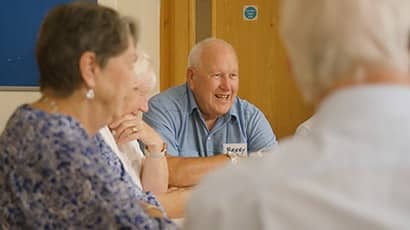
21 January 2026
Dementia support groups developed by professor adopted across globe
A programme started by a UWE Bristol academic to provide emotional and practical support for people with dementia is now being adopted around the world.

12 December 2025
UWE Bristol’s environmentally conscious and student-focused accommodation wins three awards
Purdown View, the world's largest certified Passivhaus student accommodation development, has been recognised at Property Week Student Accommodation Awards.
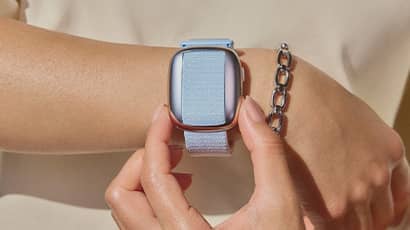
25 November 2025
Health-tech start up MyCelsius launches breakthrough cooling tech for hot flushes developed at UWE Bristol’s Launch Space
A pioneering Bristol-based health-tech company developing cutting-edge cooling technology for hot flushes has credited UWE Bristol’s Launch Space incubator with playing a key role in accelerating its product development.

14 November 2025
Lecturer wins prestigious Times Higher Education award for innovation in teaching
A senior paramedic science lecturer at UWE Bristol has been named the most innovative teacher of the year in the Times Higher Education Awards 2025.
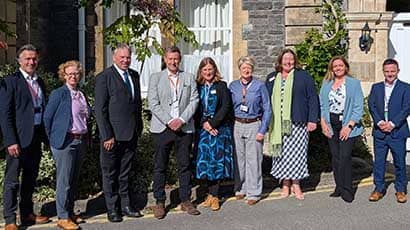
13 November 2025
Alliance Medical and UWE Bristol launch UK’s first PET-CT postgraduate certificate
In a move set to transform imaging education, Alliance Medical (AML) and UWE Bristol have joined forces to co-design and develop the UK’s first PET-CT Postgraduate Certificate (PG Cert).

13 November 2025
New AI research to revolutionise animal welfare
A UWE Bristol research project will combine behavioural science and AI to create technology that understands not only what animals do, but how they feel.

29 October 2025
UWE Bristol academic unveils breakthrough in energy-efficient AI at NATO science forum
Dr Jonathan Lancelot has developed a new form of AI that could transform how intelligent machines operate in space, defence, and remote environments.

07 October 2025
Academic playing role in project to find hidden graves in Mexico using drone technology
A UWE Bristol lecturer is playing a part in a project using drone technology to locate concealed graves in Mexico.
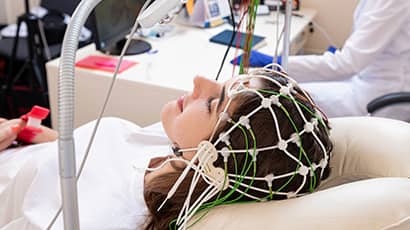
01 October 2025
New funding for researchers to develop trustworthy clinical AI for assessing brain activity
Researchers have received funding from UK Research and Innovation to help bring their innovative brain-monitoring AI technology closer to real-world use.

11 September 2025
New study to investigate augmented reality as an intervention for emotionally based school avoidance
A UWE Bristol researcher will support a new study exploring whether an augmented reality board game can help young people with emotionally based school avoidance (EBSA).






